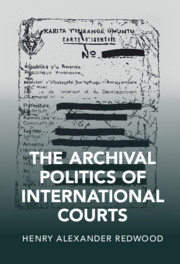Book contents
- The Archival Politics of International Courts
- Cambridge Studies in Law and Society
- The Archival Politics of International Courts
- Copyright page
- Contents
- Acknowledgements
- Abbreviations
- Chapter One The Politics of Archival Knowledge in International Courts
- Chapter Two The International Criminal Tribunal for Rwanda and Its Archive
- Chapter Three The Force of Law
- Chapter Four Contesting the Archive
- Chapter five Reconstituting Justice
- Chapter Six Imagining Community
- Chapter Seven The Residual Mechanism and the Archive
- Conclusion: The ICTR’s Archive
- Bibliography
- Index
- Cambridge Studies in Law and Society
Conclusion: The ICTR’s Archive
Published online by Cambridge University Press: 13 August 2021
- The Archival Politics of International Courts
- Cambridge Studies in Law and Society
- The Archival Politics of International Courts
- Copyright page
- Contents
- Acknowledgements
- Abbreviations
- Chapter One The Politics of Archival Knowledge in International Courts
- Chapter Two The International Criminal Tribunal for Rwanda and Its Archive
- Chapter Three The Force of Law
- Chapter Four Contesting the Archive
- Chapter five Reconstituting Justice
- Chapter Six Imagining Community
- Chapter Seven The Residual Mechanism and the Archive
- Conclusion: The ICTR’s Archive
- Bibliography
- Index
- Cambridge Studies in Law and Society
Summary
This brings these findings together and considers what this tells us about the role of archives in international criminal justice and international politics. This reveals a complex picture where the principles and strategies that underpinned knowledge production within the ICTR’s archive shifted over time, from a form of restorative justice to a more strictly retributive model. This also meant a shift from more far-reaching records of violence produced under the witnesses’ influence to a more legalistic record of violence. Over time, the archive, then, less closely reflected the needs and priorities of those affected by the genocide and arguably also produced a more conservative vision of the international community. The chapter also examines the extent to which these dynamics are an inevitable part of international criminal justice,. as a liberal tool of international governance, in part by examining the ICC. This argues that whilst there is little to suggest international criminal justice must necessarily act with such a reductionist view of its function, that these issues continue to underpin current practices of international courts.
Keywords
- Type
- Chapter
- Information
- The Archival Politics of International Courts , pp. 178 - 183Publisher: Cambridge University PressPrint publication year: 2021

